The Traveler… inhumanity at its worst…
August 21, 2017 by The Traveler · Leave a Comment
Today’s travels took me to Gloucester, England by the way of The Glocester Journal dated August 17, 1767. I found a very horrific report on the barbaric treatments that Elizabeth  Brownrigg did to the girl apprentices. She had beaten the one girl so viciously that, even though she had been found, the doctors were not able to save her life. “On Sunday morning one of the unfortunate girls who were cruelly beaten, and otherwise most barbarously treated by the their mistress… of the wounds she received from there said inhuman mistress… when it appeared by the evidence of the of the surviving girl, that, about a year and a half ago, the deceased was put apprentice, and was upon trial about a month, during which she eat and drank as the family did; that soon after her mistress, Elizabeth Brownrigg, began to beat and ill-treat the deceased, sometimes with a walking-cane, at other times with a horsewhip or a postillion’s whip… and beat her with a whalebone riding-whip on several parts of her body, and with the butt-end, divers times about the head, the blood gushing from her head and other parts of her body;…” A neighbor hearing noises from the lower area of the house had her journeyman investigate it and that is how she was found.
Brownrigg did to the girl apprentices. She had beaten the one girl so viciously that, even though she had been found, the doctors were not able to save her life. “On Sunday morning one of the unfortunate girls who were cruelly beaten, and otherwise most barbarously treated by the their mistress… of the wounds she received from there said inhuman mistress… when it appeared by the evidence of the of the surviving girl, that, about a year and a half ago, the deceased was put apprentice, and was upon trial about a month, during which she eat and drank as the family did; that soon after her mistress, Elizabeth Brownrigg, began to beat and ill-treat the deceased, sometimes with a walking-cane, at other times with a horsewhip or a postillion’s whip… and beat her with a whalebone riding-whip on several parts of her body, and with the butt-end, divers times about the head, the blood gushing from her head and other parts of her body;…” A neighbor hearing noises from the lower area of the house had her journeyman investigate it and that is how she was found.
~The Traveler
The Traveler… must have been a slow news day…
August 7, 2017 by The Traveler · Leave a Comment
I journeyed today to London, England via The Post Boy dated August 8, 1717. I found in the news from Paris that “On Wednesday last, about 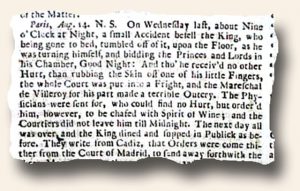 Nine o’Clock at Night, a small Accident befell the King, who being gone to be, tumbled off of it, upon the Floor… And tho’ he receiv’d no other Hurt, than rubbing the Skin off one of his little Fingers, the whole Court was put into a Fright… The Physicians were sent for, who could find no Hurt, but order’d him however, to be chased with Spirit of Wine…”
Nine o’Clock at Night, a small Accident befell the King, who being gone to be, tumbled off of it, upon the Floor… And tho’ he receiv’d no other Hurt, than rubbing the Skin off one of his little Fingers, the whole Court was put into a Fright… The Physicians were sent for, who could find no Hurt, but order’d him however, to be chased with Spirit of Wine…”
It must have been a slow news day if falling out a bed and receiving a skinned finger makes the big news! Hmmm, maybe the King had some of the “Spirit of Wine” prior to his going to bed as well? Food for thought!
~The Traveler
The Traveler… tired of pirating… checking out early?…
November 21, 2016 by The Traveler · Leave a Comment
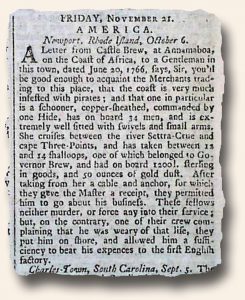 I traveled to London by The London Chronicle of November 22, 1766 where if found that not all Pirates are bad. An article with the dateline “Newport, Rhode Island, October 6” which is from “a letter from Castle Brew, at Annamaboa, on the Coast of Africa…”. It talks about the pirate infested areas along the coastline, but in particular the one ship “commanded by one Hide”. “…These fellows neither murder, or force any into their service; but, on the contrary, one of their crew complaining that he was weary of that life, they put him on shore, and allowed him a sufficiency to bear his expences to the first English factory.”
I traveled to London by The London Chronicle of November 22, 1766 where if found that not all Pirates are bad. An article with the dateline “Newport, Rhode Island, October 6” which is from “a letter from Castle Brew, at Annamaboa, on the Coast of Africa…”. It talks about the pirate infested areas along the coastline, but in particular the one ship “commanded by one Hide”. “…These fellows neither murder, or force any into their service; but, on the contrary, one of their crew complaining that he was weary of that life, they put him on shore, and allowed him a sufficiency to bear his expences to the first English factory.”
There is also an interesting article from Paris… “Within a month or six weeks past, several persons in this city, tired of life, have sought the means to deprive themselves of it. Some of them have done it by pistols; but a Baker who in cool blood leaped from the top of Pont-Royal… and was only slightly wounded:… however it was imitated a few days ago by a young man,… threw himself out of a window of the third story into the garden of the royal palace; whereby all his limbs were either broken, or dislocated; and when they raised him up, he only said that it was very unhappy for him that the houses of Paris were so low…”.
~The Traveler
The Traveler… being “turn’d off”…
September 19, 2016 by The Traveler · Leave a Comment
Today my journey took me to London, England, by the means of The Post Boy dated September 20, 1716. There I found the Ottoman-Venetian War was going strong with little relief for the Turks. Even their truce request of a couple hours in order to bury dead had been denied. Then only to be faced with coming into  battle with nails and iron and iron spikes being hidden in the sand and planks at the Communication Bridge which lamed their horses and then to be fired upon by cannon and small shot, killing more men.
battle with nails and iron and iron spikes being hidden in the sand and planks at the Communication Bridge which lamed their horses and then to be fired upon by cannon and small shot, killing more men.
I found an interesting article on the back page. “…Last Wednesday night, a Man being at the Gallows, about to be hang’d, was pardon’d; and the Friday following, another being just ready to be turn’d off, the Duchess of Berry pass’d by that Place to the Opera, and ask’d what was the Matter. Being told, she order’d the Lieutenant-Criminal to deferr Execution, while she went back, and interceded for him to the Duke-Regent. Having obtain’d his Pardon, she sent one of her Pages with it; whereupon, the Cord was cut from about his Neck, and he with much ado brought down the ladder…”
~The Traveler
The Articles of Confederation formally united the 13 colonies (revisited)…
August 29, 2016 by GuyHeilenman · Leave a Comment
An oldie, but a goodie…
The following post was originally published in 2008:
For a collector of historic American documents as printed in period newspapers a printing of the “Articles of Confederation” would be a very significant issue. With much credit to Wikipedia, the creation & importance of this document provides some fascinating reading:
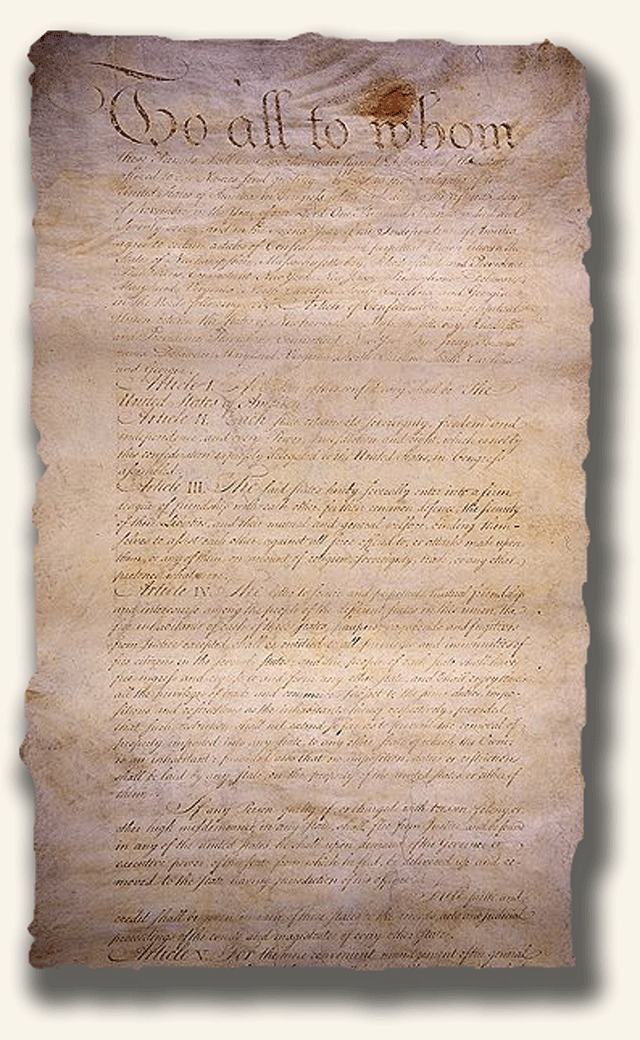 The Articles of Confederation was the governing constitution of the alliance of thirteen independent and sovereign states known as the “United States of America.” The Articles’ ratification, proposed in 1777, was completed in 1781, legally uniting the states by agreement into the “United States of America” as a union with a confederation government. Under the Articles (and the succeeding Constitution) the states retained sovereignty over all governmental functions not specifically deputed to the central government.
The Articles of Confederation was the governing constitution of the alliance of thirteen independent and sovereign states known as the “United States of America.” The Articles’ ratification, proposed in 1777, was completed in 1781, legally uniting the states by agreement into the “United States of America” as a union with a confederation government. Under the Articles (and the succeeding Constitution) the states retained sovereignty over all governmental functions not specifically deputed to the central government.
The last draft of the Articles was written in the summer of 1777 and adopted by the Second Continental Congress on November 15, 1777 in York, Pennsylvania after a year of debate. The Articles set the rules for operations of the “United States” confederation. The confederation was capable of making war, negotiating diplomatic agreements, and resolving issues regarding the western territories; it could not mint coins (each state had its own currency) nor could it borrow money, whether inside or outside the United States. An important element of the Articles was that Article XIII stipulated that “their provisions shall be inviolably observed by every state” and “the Union shall be perpetual”.
The Articles were created by the chosen representatives of the states in the Second Continental Congress out of a perceived need to have “a plan of confederacy for securing the freedom, sovereignty, and independence of the United States.” Although serving a crucial role in the victory in the American Revolutionary War, a group of “federalists” felt that the Articles lacked provisions for a sufficiently effective government. The key criticism by those who favored a more powerful central state (the federalists) was that the government lacked taxing authority; it had to request funds from the states. Another criticism of the Articles was that they did not strike the right balance between large and small states in the legislative decision making process. Due to its one-state, one-vote structure, the larger states were expected to contribute more but had only one vote. The Articles were replaced by the United States Constitution when created in 1787.
Our issue of the Pennsylvania Ledger dated March 11, 1778 contains the complete printing of the Articles of Confederation. The many photos will allow you to enjoy the significance of the newspaper and to appreciate how those who held this actual edition some 230 years ago might have felt knowing the independent colonies were joining together for a common cause–to not only provide a foundation for a united country which might some day–hopefully–become a world player, but for more immediate purposes, to survive the incursions of the British during the ongoing Revolutionary War. In 1778 no one knew how either effort might turn out.
Enjoy the issue!
Archaeologists uncover secrets of historic Revolutionary War battle site…
November 19, 2015 by GuyHeilenman · Leave a Comment
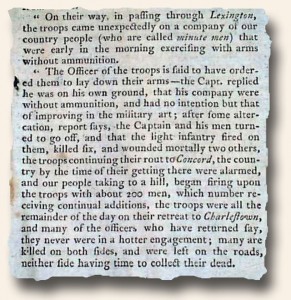 While reports of the events surrounding the skirmish at Lexington & Concord (1775) are few and far between, due to their undisputed importance, authentic newspapers with first-hand accounts are highly prized. A current archaeological effort in and around the area are sure to only increase public interest. The following article brings to light some of the recent finds:
While reports of the events surrounding the skirmish at Lexington & Concord (1775) are few and far between, due to their undisputed importance, authentic newspapers with first-hand accounts are highly prized. A current archaeological effort in and around the area are sure to only increase public interest. The following article brings to light some of the recent finds:
Archaeologists uncover secrets of historic Revolutionary War battle site
The Traveler… not quite the intended effect…
November 2, 2015 by The Traveler · Leave a Comment
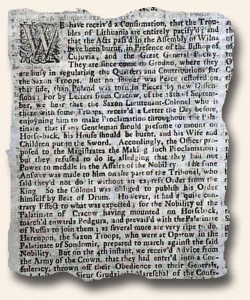 Today I traveled to London by the way of The Post Boy dated November 1, 1715. While peace in Lithuania now prevailed, Poland was being torn into pieces. A proclamation was made “…that if any Gentleman should presume to mount on Horse-back, his House should be burnt, and his Wife and Children put to the Sword… However, it had a quite contrary Effect to what was expected; for the Nobility of the Palatinate of Cracow having mounted on Horseback, march’d towards Podgura and prevail’d with the Palatinate of Russia to join them; as several more are very ripe to do…The Muscovites, to the Number of 20000 Men, are arrived within 8 Leagues of this City, and pursue their March, with all speed, for Pomerania.”
Today I traveled to London by the way of The Post Boy dated November 1, 1715. While peace in Lithuania now prevailed, Poland was being torn into pieces. A proclamation was made “…that if any Gentleman should presume to mount on Horse-back, his House should be burnt, and his Wife and Children put to the Sword… However, it had a quite contrary Effect to what was expected; for the Nobility of the Palatinate of Cracow having mounted on Horseback, march’d towards Podgura and prevail’d with the Palatinate of Russia to join them; as several more are very ripe to do…The Muscovites, to the Number of 20000 Men, are arrived within 8 Leagues of this City, and pursue their March, with all speed, for Pomerania.”
~ The Traveler
A ghost robs a bank (revisited)…
October 29, 2015 by GuyHeilenman · Leave a Comment
And just in time for Halloween, a report from “The Observer” of London, January 1, 1797 (original post, 2010):
The Traveler… a sweet business…
September 21, 2015 by The Traveler · Leave a Comment
 Today I traveled to back London, England by The London Chronicle of September 21, 1765. I found the reporting of some sweet business happening in New England, the making of maple syrup! “Having chosen out a large maple-tree, suitable for the purpose, they with an axe box it…a kind of trough is prepared… in order to retain the sap as it runs down. By this means upwards of 30 gallons from one tree has been drawn in a day;… produces a sugar, the grain of which is equal in fineness to the the Jamaica… upwards of 600 lb. was made by one man the last season…”
Today I traveled to back London, England by The London Chronicle of September 21, 1765. I found the reporting of some sweet business happening in New England, the making of maple syrup! “Having chosen out a large maple-tree, suitable for the purpose, they with an axe box it…a kind of trough is prepared… in order to retain the sap as it runs down. By this means upwards of 30 gallons from one tree has been drawn in a day;… produces a sugar, the grain of which is equal in fineness to the the Jamaica… upwards of 600 lb. was made by one man the last season…”
~The Traveler
They put it in print… the Stamp Act…
August 27, 2015 by GuyHeilenman · Leave a Comment
 Some of the most noteworthy events in history have humble beginnings. Such is the case with the announcing of the passage of The Stamp Act in The Gentleman’s Magazine, March, 1765. Under the Historical Chronicle section is the rather inconspicuous note, “Lord Mansfield, as speaker, and the Earls Gower and Marchmont, by virtue of a commission from his majesty, gave the royal assent to the following bills: …for laying a stamp duty in the British colonies in America.” While this official notification of the Stamp Act most likely flew under the radar of most readers of the day, there is no doubt regarding its significance. I wonder which one-liners which go unnoticed today will prove similar ten years from now?
Some of the most noteworthy events in history have humble beginnings. Such is the case with the announcing of the passage of The Stamp Act in The Gentleman’s Magazine, March, 1765. Under the Historical Chronicle section is the rather inconspicuous note, “Lord Mansfield, as speaker, and the Earls Gower and Marchmont, by virtue of a commission from his majesty, gave the royal assent to the following bills: …for laying a stamp duty in the British colonies in America.” While this official notification of the Stamp Act most likely flew under the radar of most readers of the day, there is no doubt regarding its significance. I wonder which one-liners which go unnoticed today will prove similar ten years from now?


